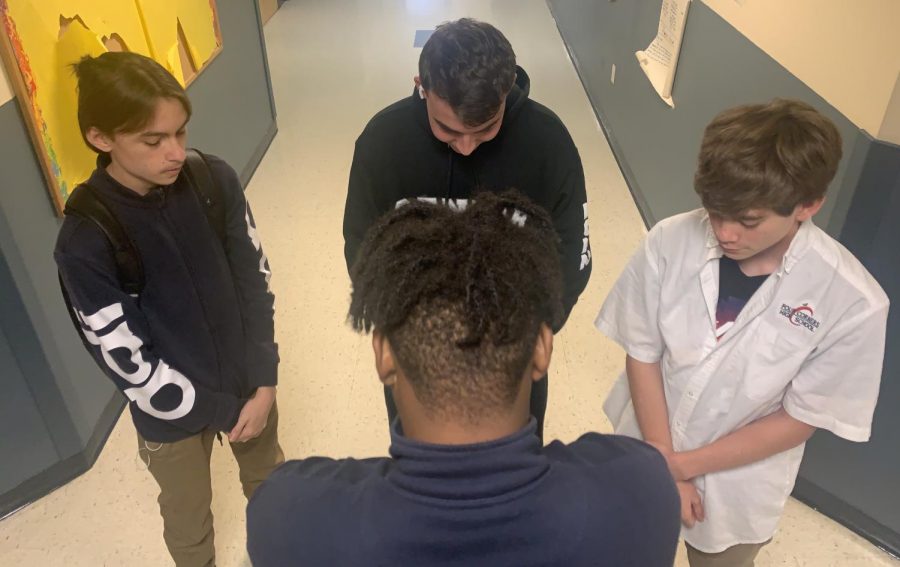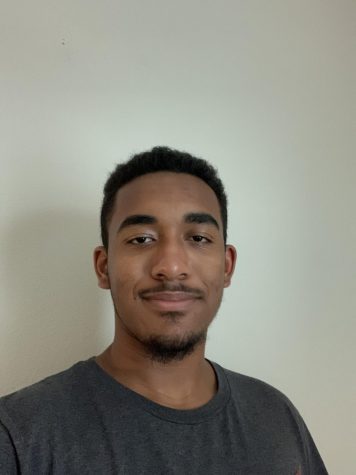Prejudice and Pride, a Loss of Openness
Senior, Jonathan Chetram-Ninvalle demonstrates what prejustice looks like with seniors, Jay Wintersgil, Dorian Conn and Junior, Eric Siegworth.
October 25, 2021
Society has undergone a drastic change in the last couple of years, the population of the United States have become even more callous and cold to one another.
The nation’s collective worries have led to people letting their prejudice dictate whether they will tolerate or form a connection with their neighbors and fellow citizens. It is become an epidemic with the next generation of the United States.
“I remember, I was in high school, and there was this girl that like, I didn’t like, and I don’t know why I didn’t like her because it was, you know, 25 years ago, but I ended up getting to know her. And she ended up being one of my best friends,” English Teacher Mrs. Gardeiff said.
Young adults, especially teenagers, are growing up and learning social cues and habits from their parents and social media. Teenagers nowadays are living in a very chaotic world, COVID-19 ravages the masses and prevents them from being close to their fellow peers and friends, the news that is constantly pushed in their faces develops feelings of despair in their hearts, which leads to them lashing out in ways that leave scars in everyone around them.
“I do think that since people are more tense nowadays due to the whole COVID situation. People are like, it is like on their last nerves,” sophomore, Omar Grini stated.
News outlets preach messages of acceptance but are drowned out by the sadness of the world, so other organizations have attempted to take the charge in trying to revive the openness and kindness of the average American.
“Well, I have definitely gotten better about that as an adult because of that experience, and I think a lot of that just comes with maturity,” Mrs. Gardeiff said.
A big contributor to the lack of empathy and willingness for people to come together and have a conversation is their lack of understanding of another’s culture or appearance. Political parties continue making Americans stand on either side of each other. Experiences vary from person to person, especially if it comes from a religious place rather than a political one
“I think it is very prevalent because I’m Muslim. People automictically assume the stereotype that we are all terrorists. Well, it is not true. I have been here for my whole school career, and I have never blown anybody up,” Grini stated.
It is no surprise that Americans are still recovering from the attack on 9/11, it was a traumatic time for everyone, but as a result people like Omar who wish to practice their religion like everyone are scrutinized and made fun of with offensive jokes and judgments regardless of their character. People who happen to be Muslim are just like people who are Christian, Catholic, and Atheist. However, even if religion or politics are not the main driving force behind prejudice and fear, people will still find ways to make assumptions about others. Mostly by how you appear to them.
“Oh, absolutely. Yeah, I know for that for a fact. I sometimes have a look on my face. That I guess says ‘don’t talk to me ever’ and students at the school I am close to, they were like ‘before I knew you, I was terrified of you’. Like I give off this scary person vibe,” Mrs. Gardeiff said.
A person’s facial expression is enough for a person to create a false assumption about you.
“So, I have gotten yelled at for not knowing how to speak Spanish even though I have no Hispanic or Latino descent. People think I am middle eastern and must be trying to blow up something again, wrong ethic background,” United States Government History teacher, Mrs. Walton said.
Whether or not it is morally correct to judge a person or group before understanding their intentions because of the pigment of their skin, racism and xenophobia have become deep rooted in the American experience and the history of the nation.
“I remember this distinctively, I was with my husband, we walked into a restaurant, and everybody stopped and stared at me. I was the only person who is not white,” Mrs. Walton said.



